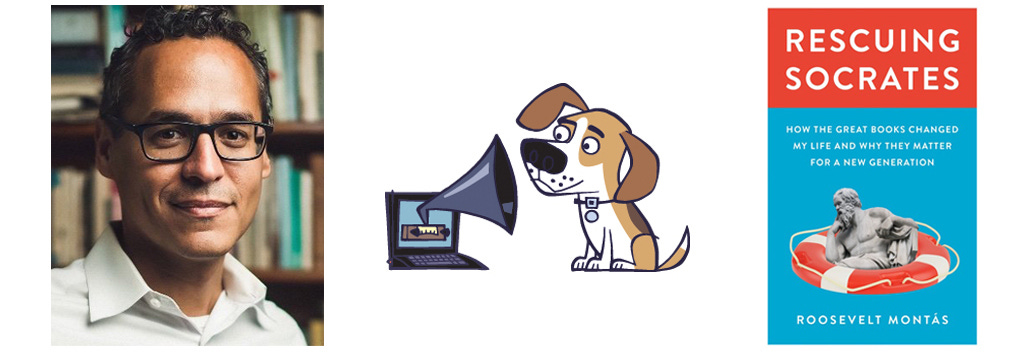Transcript: Roosevelt Montás On Saving The Humanities
A poor kid from the Dominican Republic found solace in Socrates and other great thinkers.
Montás, who led the humanities-rich Core Curriculum at Columbia for a decade and still teaches there, has a new book out, Rescuing Socrates. We talk of Augustine and Socrates and Freud and Gandhi and the timelessness of the great texts. His book is a kind of response to the notion that these ideas and texts are somehow blighted by “whiteness” — a topic the Dish has tackled before. I loved this conversation — and the relief it gave from contemporary political and cultural obsessions.
This episode aired on January 21, 2022. Some money quotes from Roosevelt:
On the collapse of the humanities: People are “fleeing them because what they're getting in them is a lot of fluff, a lot of junk, a lot of insubstantial, vacuous, confused, meaningless junk.”
On students today: “In fact, students are obsessed with existential questions. They are obsessed with, ‘Is there really no other point to this life I'm living than to make a lot of money? To be the boss? Is that really all there is?’”
On what should happen in the classroom: “You are in a conversation, in a real communion, over things that matter to all of us by virtue of our humanity … That's liberal education.”
On the truth: “It’s not something that can be given to you, imposed on you, told to you, but something that can be sparked in you.”
Andrew: Hi, we're back. Another Dishcast for the new year. Particularly excited this time because we get to talk about ideas and thinkers across time and space. And this episode we've invited Roosevelt Montás. Roosevelt teaches at Columbia and has taught for a long time, and was in charge of the core curriculum there for about a decade. He's written this book called Rescuing Socrates: How the Great Books Changed My Life and Why They Matter for a New Generation.
Readers and Dishheads will know this is not exactly a minor concern of mine. I've been doing the same thing in trying to understand the world through these thinkers, and have become rather depressed at how marginalized some of these thinkers have been for all sorts of political reasons. Also how contemporary education seems to be moving quite decisively away from what I always understood to be a concept of liberal learning, liberal education, meaning dedication to free thought, wherever it leads one, and to the greatest thought.
I was particularly thrilled, although Roosevelt may not be too thrilled for me to mention it, that Matthew Arnold is in this book. Just very briefly, as an aside. It's good to see someone capable of even acknowledging the concept of the greatest that human beings have ever thought and read. The highest forms of expression and an appreciation of genius.
We're still reading some of these classical texts, what people have called, I think, misleadingly, Great Books. We're still reading them. They're still, to me at least, truly radical texts, deeply subversive, hugely fascinating. They can never, almost definitionally, be outmoded or finished. They have lasted longer than any intellectual fad, any academic discourse, any political regime. We are still talking about them and still thinking about them, and Roosevelt has dedicated his life, really, to bringing them to people who might otherwise not discover them. First generation, low income kids — he specialized in bringing the classics to them.
Roosevelt, welcome. You were one of those kids. I just want to remember your experiences. You are an immigrant like me, from an island like me, but a completely different universe. You came, I think you said in your book, from somewhere that was a 19th century village in the Dominican Republic which had still 18th century values, something like that.
Anyway, it was a different world that you came from. As a kid, you had no education to speak of at the beginning. And you are now teaching underprivileged kids, some of the greatest minds on earth.
Tell me, what is that transition like? There must have been moments when the distance from where you started to where you are must have given you some kind of vertigo.
Roosevelt: Thank you, Andrew. It's a pleasure to be here and to have a chance to talk with you about some of these books, some of these ideas, some of the experiences in my life that have come into shaping this book and that really fire, fuel my drive to advocate for this kind of education.
I grew up in a little town called Cambita Garabito, in the province of San Cristobal in the Dominican Republic. My town, when I was growing up, didn't have paved roads. I remember when that happened. We didn't have reliable electricity or water. At first we didn't have running water. I remember when that happened too. We had one telephone in the whole town and the one gas station. I didn't have appliances. I didn't have TVs, or refrigerators, or a stove at home.
My parents had grown up in an even kind of further underdeveloped place. Sometimes I say that I was raised in the 19th century by people who had grown up in the 18th century. Then I came to New York in 1985, not speaking English. My mother had managed to come to New York. She managed to get a minimum wage job in a garment factory. The whole point of her coming to New York, as is still the case for many other Dominican poor immigrants, was to bring her family over.
The moment she got here, she started doing the legal process to sponsor my older brother and I. So then we came in May of 1985.
Keep reading with a 7-day free trial
Subscribe to The Weekly Dish to keep reading this post and get 7 days of free access to the full post archives.


